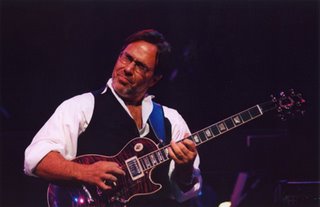 Let me preface this by saying that Al DiMeola may actually be the very best guitarist on the planet today.
Let me preface this by saying that Al DiMeola may actually be the very best guitarist on the planet today.That's a pretty bold statement, but I don't make it lightly. He literally seems unlimited in terms of what he can play. And his impeccable technique, accuracy, and blinding speed are legendary. However, his music is VERY sophisticated and so - it's not for everyone.
It is probably beyond the understanding of most people, or at least appreciating it is more work than a lot of people are willing to do to listen to music. I have played little snippets for some young musicians lately and their eyes nearly popped out of their heads. They didn't know music like this even existed. There is just so much sheer musical content stuffed in there, that many people would miss it, because they are used to simple radioplay material. Each piece (I hesitate to call it a song) probably has more movements and changes than an entire album of music from a typical artist. If you were a songwriter looking for ideas, you could easily take any two bars of music from any Al DiMeola piece and make an entire song from that.
Imagine a person who talks nonstop for 10 minutes, and in that 10 minutes, he tells you the cure for cancer, the solution to terrorism, the cure for hunger and poverty, gives the key to correcting our economy, solves the problems of the Middle East, and shows you the technology for invisibility, instantaneous travel, and a great tasting hamburger that actually makes you thin when you eat it. Well, an Al DiMeola piece is kind of like a musical version of that. If you're not paying attention, you'll miss a lot of good stuff! If you've never heard him, then you are in for a treat.
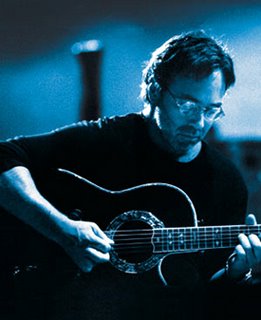 Al has evolved over the decades and his music is a little different now compared to what it was in the 90's and that was different again from what it was in the 70's and 80's. I think to understand who and what he is, you need to get at least two albums. Let me explain:
Al has evolved over the decades and his music is a little different now compared to what it was in the 90's and that was different again from what it was in the 70's and 80's. I think to understand who and what he is, you need to get at least two albums. Let me explain:The music that originally made him a well-known guitar player is probably his work with Chick Corea and Return to Forever, especially the album, Romantic Warrior. That's the RTF album I enjoy the most. Then his first solo albums after leaving Return to Forever vaulted him into icon-level recognition in the guitar world. These are albums like: Land of the Midnight Sun, This is Jazz, Elegant Gypsy, Casino, Soaring Through a Dream, etc. This is the time when he was an absolute so-called "Guitar God", playing a black Les Paul Custom and making it sing and soar at triple speed, with his ultra-precise runs. That is what made him famous.
The music itself is a latin-jazz-rock fusion. It sounds like the musical version of Swiss clockworks. All the pieces of the band working together with absolute precision, but in imaginative ways. It's very progressive. Very sophisticated. Not everyone can truly appreciate it, but many musicians are wowed by the technical challenge and achievement of it. It's not ALL a high-speed parade of instrument skills though. There is definitely musical value in these pieces. Some are very beautiful, but the first thing that strikes most people is how good the musicians are technically.
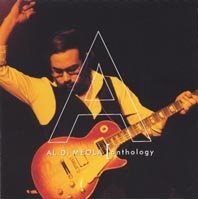 The best way to capture that whole early era of his career is to get his "Anthology" album. That is a double album that has a nice cross section of his better tunes from those albums. I would certainly recommend that one to listen to first.
The best way to capture that whole early era of his career is to get his "Anthology" album. That is a double album that has a nice cross section of his better tunes from those albums. I would certainly recommend that one to listen to first.But then, for a while, Al went into some weird phases during the so-called "Manhattan Years" and made music that sounded too bizarre for me to enjoy. That stuff was just way out there with weird time signatures for two bars, then changing again, and again, and again. It's almost as if he was deliberately trying to come up with material that displayed how tight the band was and how controlled and precise, but it sounds to me as if no one cared whether the end product was listenable to anyone.
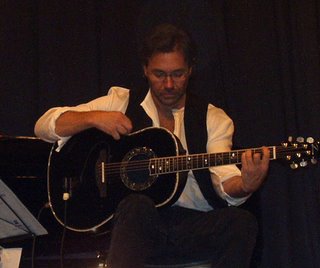 Then he evolved to a new place again. This time, it was much more gentle, beautiful music, but still with that Latin Jazz flavor with a touch of rock thrown in here and there. And even slightly more than a hint of classical music.
Then he evolved to a new place again. This time, it was much more gentle, beautiful music, but still with that Latin Jazz flavor with a touch of rock thrown in here and there. And even slightly more than a hint of classical music.I believe this represented a change of focus away from instrumental virtuosity, and toward the essence of the music itself. Now it creates moods. It has space. It flows. It dreams. It lives.
He focused on the percussion more and added other orchestral instruments like violins, etc.. He also made the piano more prominent, I think. With the guitar, he started doing a lot more acoustic work and moved away from the electric stuff.
I bought the same acoustic guitar as his: the top of the line Ovation 1869 Custom Legend. Except that I got mine in a deep cherry burst finish and his is black. I also bought my first Gibson Les Paul Custom because of him, though his was black and mine was white. Then I bought another one to replace it, but a three pickup one. And I still have that one today.
Probably because of my appreciation of his work, combined with the fact that I liked to play some of his pieces in live shows back when I was a full-time professional guitarist, the other band members and other people used to jokingly refer to me as "Val DiMeola". I do not profess to play as well him, however. I played his music, but few people can play as well as him. My fellow band members humored me by allowing me to add a couple of early Al DiMeola pieces to the setlist that we played every night. It was our chance to show off - but it also added to our musician credentials that we could play that material.
Then my style changed after one day a friend of mine came to see me playing in a club and said, "Your playing is very impressive, but why do you always want to make the guitar sound like a machine gun? I thought it was supposed to be about MUSIC" Those were words of wisdom. After that, my playing changed. It was no longer about speed and precision for me. It was now about the music.
I think Al came to that same conclusion in the 1990's. In a relatively recent interview, he said that if he and his band tried to play the original music they played back in the 70's and 80's now every night, they'd probably have heart attacks. It was just too intense, too demanding to play.
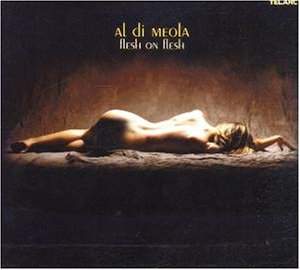 His latest album is Flesh on Flesh and it's quite good. He is merging his newer style of music with some of his old electric tones and tricks. So he has all the Latin percussion and piano, and different instruments, and plenty of acoustic guitar, and classical instruments and passages, AND the sizzling electric guitar stuff thrown in there for good measure. He's trying to keep everybody happy, I suppose.
His latest album is Flesh on Flesh and it's quite good. He is merging his newer style of music with some of his old electric tones and tricks. So he has all the Latin percussion and piano, and different instruments, and plenty of acoustic guitar, and classical instruments and passages, AND the sizzling electric guitar stuff thrown in there for good measure. He's trying to keep everybody happy, I suppose.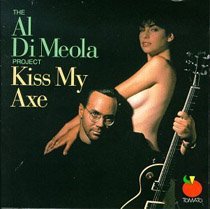 But I would say that my overall favorite Al DiMeola album to just LISTEN to is probably "Kiss My Axe". Some guitarists don't like this one because there is less wild and fast guitarwork on it, but I find the music is beautiful. It does have his style all over it, but it's far more subtle. And the guitar serves the music, rather than the music being a backdrop for jawdropping guitarwork. Also, frankly, I find the overall production quality and fidelity is higher than the older recordings. I assume this is because it's recorded on newer digital equipment, rather than the older analog tape equipment that was available in the 70's and 80's.
But I would say that my overall favorite Al DiMeola album to just LISTEN to is probably "Kiss My Axe". Some guitarists don't like this one because there is less wild and fast guitarwork on it, but I find the music is beautiful. It does have his style all over it, but it's far more subtle. And the guitar serves the music, rather than the music being a backdrop for jawdropping guitarwork. Also, frankly, I find the overall production quality and fidelity is higher than the older recordings. I assume this is because it's recorded on newer digital equipment, rather than the older analog tape equipment that was available in the 70's and 80's.If you want to experience Al DiMeola's music properly, my recommendation is to get his Anthology album first, to see why he became famous, and truly appreciate his mastery of guitar and his approach to music. Then get "Kiss My Axe" to get what I consider to be his best, most beautiful music. Then, once you are up to speed so-to-speak, get his latest album, Flesh On Flesh to see where he is at the moment. If you just rush to this last album, you might not understand it out of context. Do it in the right sequence and see the progression, and you may find that your tastes and understanding can evolve along with him to a degree.
I found similar guitar samples
ReplyDeletehttps://www.lucidsamples.com/house-sample-packs/216-guitar-house-mafia.html